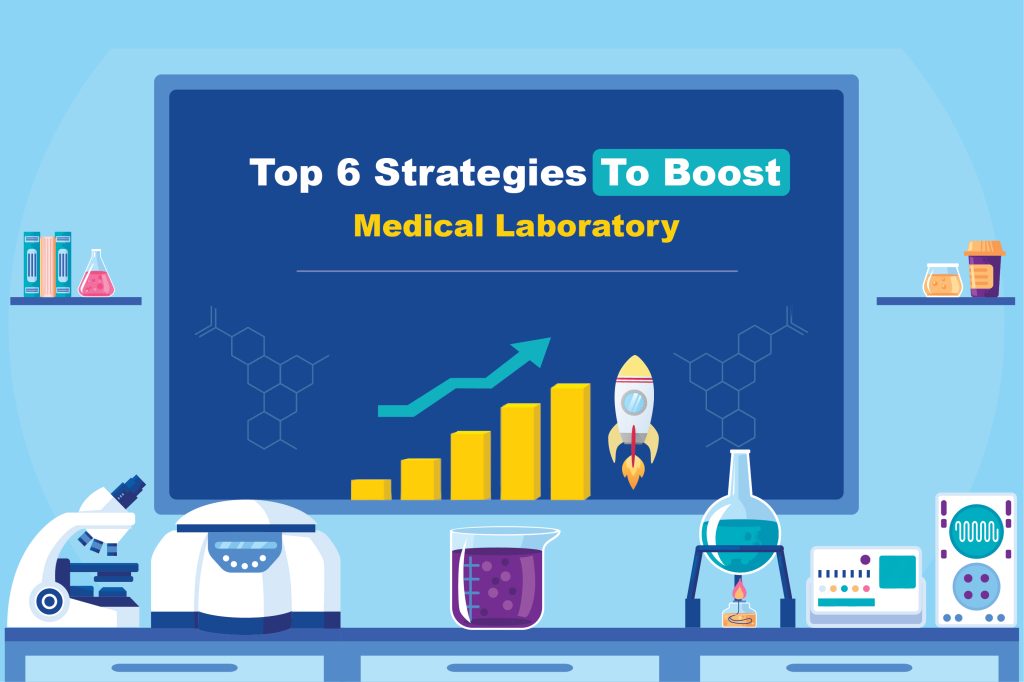Introduction
In the dynamic and ever-evolving field of healthcare, medical laboratories play a crucial role in diagnostics, research, and patient care. To ensure the continued success and growth of these vital entities, it’s essential to implement strategic approaches that boost employee satisfaction, foster professional development, and enhance overall efficiency. In this blog post, we will explore the top 6 strategies to Boost medical laboratory performance.
1. Create Clear Growth Paths – Boost Medical Laboratory
Outlining Promotion Criteria:
Establish transparent promotion criteria based on skills, experience, and performance. This not only motivates employees but also provides a clear roadmap for career advancement within the laboratory.
Non-CLIA Designated Roles:
Introduce roles that don’t fall under the Clinical Laboratory Improvement Amendments (CLIA) designation, expanding career options for staff who may not have a traditional laboratory background.
2. Invest in Professional Development and Training
Mentorship Programs:
Implement mentorship programs to facilitate knowledge transfer and skill development. Pair experienced professionals with newer staff to encourage continuous learning and growth.
Industry-Wide Welcome:
Embrace professionals from various industries, encouraging diversity and cross-pollination of ideas. This approach can bring fresh perspectives and innovative solutions to laboratory challenges.

3. Stay Competitive in the Job Market
Market Analysis:
Regularly conduct market analyses to ensure that compensation and benefits packages remain competitive. This practice helps attract and retain top talent in the fiercely competitive healthcare job market.
Internal Review:
Assess internal processes and policies to identify areas for improvement. A well-organized and supportive work environment can be a significant factor in retaining skilled laboratory professionals.
4. Prioritize Employee Engagement
Be Present and Listen:
Foster a culture of open communication by being present and actively listening to employee concerns and suggestions. A supportive leadership team can significantly contribute to job satisfaction.
Provide Transparent Leadership:
Maintain transparency regarding organizational goals, changes, and challenges. When employees understand the bigger picture, they are more likely to feel engaged and invested in their work.
5. Improve Shift Differentials
Early Shift Differentials:
Consider offering differentials for early shifts to encourage flexibility in scheduling. This can be particularly attractive to employees who value work-life balance and may prefer early hours.
Competitive Rates:
Ensure that shift differentials and overall compensation packages are competitive with industry standards. Adequate compensation is a key factor in retaining skilled professionals.
6. Attract Talent Through Innovation
Invest in Training:
Allocate resources to continuous training and development programs. Equip your team with the latest technologies and methodologies, making your laboratory an attractive place for professionals seeking to expand their skill sets.
Stratify Skillsets:
Recognize and reward diverse skill sets within the team. Encourage specialization in niche areas, creating a well-rounded and versatile workforce capable of tackling various challenges.
Conclusion
Elevating medical laboratory performance requires a holistic approach that addresses both the professional growth of employees and the overall efficiency of operations. By implementing the strategies outlined above, laboratories can foster a thriving work environment that attracts top talent, retains skilled professionals, and ensures the delivery of high-quality healthcare services.
Frequently asked questions
How do you ensure quality in the laboratory?
Quality assurance protocols, regular training, and adherence to industry standards are crucial in maintaining laboratory quality. Continuous monitoring and improvement processes also contribute to quality assurance.
How do you manage a clinical laboratory?
How do you manage a clinical laboratory?
Effective management involves clear communication, strategic planning, and regular assessments of operational processes. Implementing efficient workflows, maintaining a skilled workforce, and staying updated on industry advancements are key components.
What is medical laboratory management?
Medical laboratory management involves overseeing the day-to-day operations of a laboratory, ensuring compliance with regulations, managing personnel, and implementing strategies to enhance efficiency and quality of services.
How do I write a business plan for a lab?
A laboratory business plan should include an executive summary, company description, market analysis, organizational structure, services offered, marketing and sales strategy, and financial projections. It should provide a comprehensive overview of the laboratory’s goals and how it plans to achieve them.


